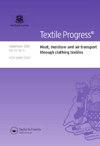Wearable electronic textiles
IF 3.1
Q2 MATERIALS SCIENCE, TEXTILES
引用次数: 9
Abstract
Abstract Whilst the bulk of products classified as wearable technologies are watch-like bands that are worn on arms and legs, there is growing interest not only in garments that incorporate sensors and actuators, but also in sensors and actuators that are textile-based. The vision is for information-gathering garments where the electronic components are both inconspicuous and comfortable, and where the data gathered is integrated into a broader information-rich infrastructure. Fundamental to realising this goal is the extensive use of smart materials and conductive textiles, which are here reviewed. Advances in textile-based sensors and actuators are documented, as are also developments in the generation and storage of electrical power. Also addressed are the protocols and available information technologies that are relevant for integrating these products within an Internet of Things (IoT) framework. The procedures and practices for developing apparel products incorporating these technologies are discussed. Some insights into the state-of-the-art are gained from examining commercial products and the reports of interdisciplinary research projects. The conclusion is largely that we are at an early stage of realising the IoT vision, but that prototypes emerging justify an attitude of cautious optimism.可穿戴电子纺织品
摘要虽然被归类为可穿戴技术的大部分产品都是戴在手臂和腿上的类似手表的带子,但人们不仅对包含传感器和致动器的服装越来越感兴趣,而且对基于纺织品的传感器和致动器也越来越感兴趣。该愿景是为信息收集服装设计电子组件既不显眼又舒适的服装,并将收集的数据集成到更广泛的信息丰富的基础设施中。实现这一目标的基础是智能材料和导电纺织品的广泛使用,本文对此进行了综述。记录了基于纺织品的传感器和致动器的进展,以及电力产生和存储的发展。还讨论了与物联网(IoT)框架内集成这些产品相关的协议和可用信息技术。讨论了采用这些技术开发服装产品的程序和实践。通过对商业产品的研究和跨学科研究项目的报告,我们对最先进技术有了一些见解。结论主要是,我们正处于实现物联网愿景的早期阶段,但出现的原型证明了谨慎乐观的态度是合理的。
本文章由计算机程序翻译,如有差异,请以英文原文为准。
求助全文
约1分钟内获得全文
求助全文

 求助内容:
求助内容: 应助结果提醒方式:
应助结果提醒方式:


